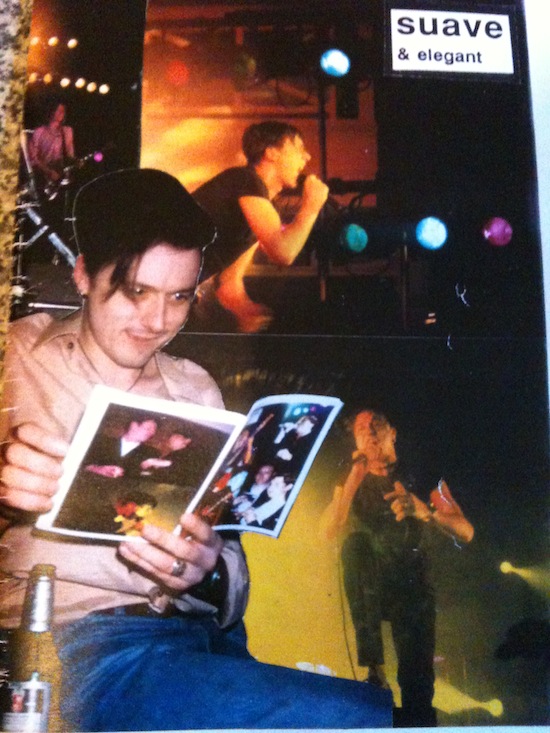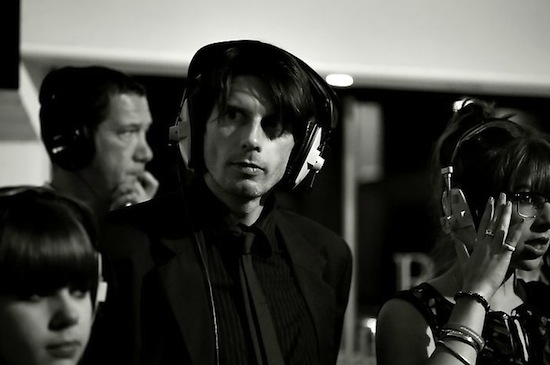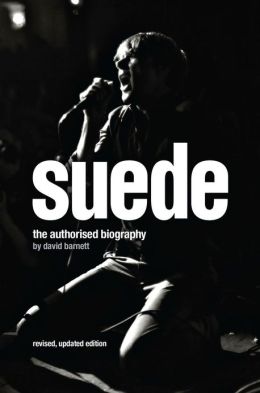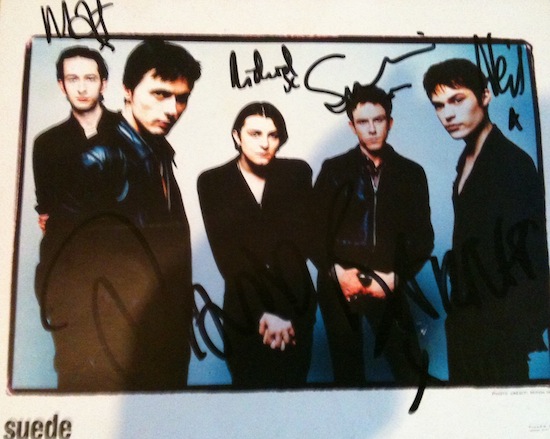I’m sitting in a rooftop garden looking out over Archway with Suede biographer, David Barnett. Further up the hill, past the shadows of ‘Suicide Bridge’, is the house where Brett Anderson wrote the vocals to Dog Man Star. Heading back down towards Junction Road lay the Archway council estates, mobs from which ‘stormed the palaces of Highgate’ in the dream that inspired ‘We Are The Pigs’. David is regaling me with stories of the old days, from how catching ‘The Drowners’ on telly led to writing his Suave & Elegant fanzine which in turn brought him into the band’s employment for eight years. The excitement of those heady times is still there in David’s voice and it strikes me enough to count that during the course of our hour long discussion, he mentions how ‘great’ it all was no less than 25 times.
"I was subliminally advertising Suede through the medium of World War II comic books," Barnett tells me of his first job working for DC Thomson and writing Commando comics. "One speech bubble read ‘Anderson and Butler have copped it, sir!’ Mat Osman was a character in one, Simon Gilbert in another. I also had ‘He’s Dead’ as a regular feature."
"I’d actually gone in for a job for their teenage pop magazines. They did Jackie, Patches, and Blue Jeans and had a policy of taking on ten school-leavers every year. In 1987, I was one of them. I went in fully expecting to be writing about Curiosity Killed The Cat and Bros. I had in my head I wanted to be the next Neil Tennant who went from Smash Hits to the Pet Shop Boys. That was my planned career trajectory. I turned up on the first day and they said ‘We’ve taken on ten school-leavers, nine of them are girls. You’re the only boy. You don’t want to be writing about all this pop nonsense, do you? You’re a boy, you’ll be interested in tanks and aeroplanes. We’ll put you on Commando for a few weeks, see how you get on.’ I ended up doing that for six years."
And in May 1992 everything changed. "I was in bed, nursing a hangover. Every Saturday morning my brother and I would watch The Chart Show and Suede came on with ‘The Drowners’. The single was just out and it was one of the first major TV appearances. I’d seen them on the Melody Maker cover but wasn’t impressed enough to buy that issue because I’d never heard of them. But catching them on The Chart Show, I thought they were great. It’s funny, looking back on it, I thought they sounded like Adam & The Ants. I also remember thinking – because it’s a fast, quickly-cut video and I’m short-sighted – that there was at least one woman in the band [laughs]. Which was kind of nearly right. So I went down and bought the 12" of ‘The Drowners’, came back and loved it. When I played the b-sides I thought they actually sounded more like The Stone Roses. Which is an influence lots of people don’t know. They were massive Stone Roses fans. Bernard had photos of them on his wall in an early interview. He was a big fan of John Squire. The Stone Roses were the missing link between The Smiths and Suede in some ways."
"I really loved them but I was living in Perth, Scotland at the time, quite far from ‘the action’. I didn’t get to see them until March ’93 when the album came out and I remember being quite disappointed by both the album and the gig, to be honest. I don’t know what I was expecting. A lot of the early stuff, like the first couple of singles, was a bit more punk rock. I was taping all their radio sessions and a lot of early gigs on the radio when they did these really short sets of about seven songs. Stuff like ‘Moving’, ‘Painted People’, and ‘Animal Lover’. All the sort of songs that they’ve disowned since, but I really like them. Funnily enough, they did do ‘Painted People’ this year for the first time since 1993! I would’ve been quite happy if the album had just included that kind of thing. I was on the verge of going off them but I really liked ‘So Young’ and then when they did ‘Stay Together’, I really really loved that and thought the b-sides were fantastic."
"Things shifted up a gear then. I went to London to see the fanclub gig at LA2. They did early versions of ‘New Generation’, when it was still called ‘Losing Myself’, and ‘This Hollywood Life’, which was called ‘Trashy’. That was an amazing gig. It was really exciting because instead of a support act they had Suede karaoke. I had gone down on my own, but met up with some penpal types through the fanzine and they were all ‘yeah, go on David, go do it’. I did and it was really good and I was thinking I’m definitely gonna win. Then Gary Prosser went up and did an absolutely blinding version of ‘Metal Mickey’. He had these two long-haired dudes either side of him miming the parts of Bernard and Mat. It looked fantastic and he won. But a few days later I got a big package in the post because they thought I was a worthwhile runner-up. I felt slightly involved then. It just escalated from there."
"That was a really exciting period, doing the fanzine. Everyday I was getting a huge sack of mail. Quite a few Agony Uncle-type letters too, people telling me about their erotic dreams about the band and their own sexual exploits. I’d think ‘why are you telling me this?’ I was selling about 300 copies by then. I would’ve sold more but I couldn’t afford it. I made a loss on every one. But by the time I started doing the colour covers, which cost nearly a pound just for the cover, it was an investment because I knew it was definitely gonna lead to something. It was worth it. And that was a really fun time, really great. I enjoyed those days."

Suave & Elegant number 6 featuring Brett avidly devouring Suave & Elegant number 5
"The next gig I went to see turned out to be Bernard’s last ever show. That was quite exciting because there was really obviously a lot of tension. The new stuff was fabulous and it was the first time I had a fanzine to sell at the gig. The Suede fan community was almost like a secret society. All these people from different parts of the country would come together around the gigs and we’d hang around in a big gang outside. Simon was the first person off the bus and I gave a copy of Suave & Elegant to him. We went off to get some lunch and when we got back Brett came off the bus. At this point, bear in mind I’m the young country bumpkin from the sticks: I’d never met anybody remotely famous before and it was a really exciting moment. ‘Oh my god, it’s Brett Anderson, oh my god!’ But when he got off the bus he went (serious tone) ‘Which one of you guys is David?’ He’s quite an intimidating character. Suave was pretty irreverent and took the piss so I was convinced he was gonna be really annoyed (laughs). But he said ‘This is brilliant, it’s the best one I’ve read. It’s really funny and I really like the bit about the songs.’ So that was nice. That was February and there were a lot of rumours going around. And then, about June, it was all in the papers that they’d broken up and I was all (aghast voice) ‘Oh god! At last I’d found a band I really like again, the first band I’d been massively into since The Smiths and oh no, it’s over and it’s only just begun.’ And from what I’d heard of the second album I knew it was gonna be brilliant. But then of course they got this little schoolboy in, and I thought ‘that’s never gonna work’ (laughs). The precedents just aren’t good. There’s hardly any band that a major member leaves and they manage to carry on. And not only carry on but actually become more successful. But then the album came out and of course it was fantastic. I got sent a pre-release copy tape of it and a laminate so I was able to go to as many gigs as I could get time off work to go to. After that it just really snowballed."
"In the back of my mind while I was doing the fanzine I thought ‘this could come in useful in the future’. I knew it was quite a privileged position to be in and it did indeed turn out to be useful. The idea for the book had been floating around for ages. But when it came down to it, there was actually only a short amount of time we had to bang it all together. We had approached people like Jon Savage and Johnny Rogan. And then finally it was ‘right, this has got to happen’, to coincide with the Singles collection. Simon Price was gonna do it. And then we were gonna do it together, but he got a job as Features Editor at Bang Magazine, so he was suddenly unavailable. Finally desperation set in, ‘Oh god, David’ll have to do it’ (laughs). So, lucky really."
"I started with a pretty comprehensive timeline. I was cutting and pasting all the reviews I’d done into this timeline to form the skeleton of the book. That was really useful. It made working out what was gonna go in each chapter pretty simple. I did regurgitate quite a lot that I’d done previously, but you know, Suede do that themselves so…I thought that was perfectly acceptable (laughs)."
And how did this updated edition come about?
"With the advent of Facebook and so on, I was more and more getting Suede fans from all over the world saying ‘Hey, how can I get a hold of your book?’, ‘Are you gonna do a new version of it?’, and ‘It’s on Amazon for £200’ [There are currently twelve on Amazon going for over £100, with one listed at £3000, used of course] and crazy things like that. It was quite frustrating. I thought about doing an e-book as an inexpensive solution. It’s a long way until I’m ever gonna recoup or make any more money out of it. So it wasn’t that. It was just the fact that people wanted to buy my book and they couldn’t. I was at the stage where I was actually thinking of typing it out myself and putting it online and saying ‘there you go’. If nobody wants to sell it, then I might as well just put it out there."
"With Suede planning a new record, the old publishers were suddenly interested. But I wasn’t sure about updating it. Other than flogging a few shirts at some of the comeback gigs – and when they lost some of the tapes, they got in touch with me for some of the content that’s on those reissues – I hadn’t been closely involved for 10 years. I didn’t really feel that it was my position to be doing an updated version on what Suede had been up to ’cause I didn’t really know (laughs). And obviously there are a lot of people who are still massively passionate about them and Brett’s solo career and what they’ve all been up to. And the people who are going to be reading it, they’ll know all that anyway."
"I was talking about the new edition with Didz (Hammond, of Cooper Temple Clause and Dirty Pretty Things fame). Somebody pointed out that he’s living my life in reverse, going from playing in indie bands to now working for Suede’s management. He’s a great guy and was really keen for the book to happen, and that we should do something new. The original idea was that the two of us would go around the pub one night, switch on the tape recorder, and tell each other our hilarious Suede stories. And, between us, we’d fill in the gaps. I thought that was quite a good idea, but more importantly it was an easy idea and would be different from just something tagged on the end of the book. I can’t remember what their argument was but the publishers didn’t like this idea. But by this time, because Didzs had been so enthusiastic about it, I thought if it’s gonna come out and it’s gonna have my name on it, we should try and make it as good as we can with the limited resources available. There was zero budget and zero time to do anything major. Officially I only had to do a 1000 words tacked on at the end, but I didn’t think that was gonna do anybody any favours. It would’ve been a bit of an insult. I thought ‘if a job’s worth doing, it’s worth doing well’. So that’s when the idea of doing the footnotes came about. I thought this would be an interesting way of updating and putting in new stuff without it just being an appendix at the end." ***
"Everything is dealt with in the footnotes. They tell you what’s happened in the past 10 years, but not necessarily in a chronological order. It’s a bit like, have you read Pale Fire? That’s an incredibly ridiculous exaggeration, I’m not pretending by any means that I’m on par with Nabokov, but, along with Stewart Lee’s How I Escaped My Certain Fate, Pale Fire was one of the inspirations for the new book. I quite like the fact that there are a lot of games going on, a lot of riddles, and it’s kind of all over the shop. But that makes it more enigmatic and it’s more like a game than just a normal book. I felt it was really important that I didn’t try to re-write history and mess with the original text. For all its flaws, this was the book they’d commissioned and sanctioned back in the day so I didn’t feel it was fair for me to independently meddle with the official history. At the same time, I wanted to add something new because I realised there would be plenty of people who already owned it who would probably buy the new version too. So the footnotes were a nice way of getting round this."

David Barnett recording handclaps for Bloodsports
"To be honest, when I started I thought it would be a really quick thing, that there’d be a couple of notes every other page. But then – because I was fairly ignorant of a lot of what had gone on post-2003, and also because I didn’t just want it be a massive ego trip – I realised that I wanted it to be something that people, especially critics of the book the first time, got a chance to say ‘well, I disagree with this, I think this is crap because of this, I think you’re wrong here’. And I quite like the idea of it being a little argumentative. I remember having a discussion with Brett about what the best Sex Pistols book was. I loved England’s Dreaming and he really liked No Irish No Blacks No Dogs. He said that the reason he liked it was because of all the contradictions, where you’d have Johnny Rotten saying one thing and then you’d have one of his mates saying ‘that’s complete bullshit’ and calling him up on it. That idea appealed and I thought it would appeal to the band as well. So I put the feelers out saying ‘hey, I know you thought this was crap. Do you fancy telling me why?’"
"Nadine (McBay), who’s a music journalist and a health therapist now, was quite critical about the way that Neil’s illness had been dealt with in the book. And she’d suffered from something similar, so was in a good place to talk about it in an intelligent way. And the more of these that came in, the more I thought this is actually quite exciting. There had been a brief reference to Julianne Regan from All About Eve in the original book [a mention in Simon’s diary, relating to a collaboration with Bernard Butler that was in the works]. I thought it’d be nice to find out her side of the story, ’cause that’s never really been told in public. She had some really interesting things to say. It was quite heartwarming and really nice of her to do it. So thanks, Julianne. And Pete [Fijalkowski] from Adorable had some brilliant stories. The gig that Saul [Galpern, Nude Records] went to see Suede at was that NME On Night at the New Cross Venue. It was Suede, Midway Still, Fabulous, and Adorable. Adorable got signed by Creation soon afterwards and Suede were like ‘oh god, no!’ I vaguely knew Pete and wondered if he remembered it. He said, ‘oh yeah, I definitely remember it’. It was quite funny because he was really nice about it, and it was a really nice different angle again. I think everybody knows the main story, everybody knows the release dates and all that, that’s not particularly interesting. But somebody with a different perspective on things, who was actually there, a contemporary in a band that was signed at the same time, is a really interesting viewpoint. And he was great." [coincidentally, on the same episode of The Chart Show that introduced David to Suede, Adorable’s ‘Sunshine Smile’ was #10, to The Drowners #6] "The footnotes ended up being like a parallel history of the band, with the benefit of hindsight and lots of different voices and different opinions, in a way that you couldn’t have done with a traditional narrative. It was almost like it was interactive, which works in a 21st Century way…slightly."
These footnotes are an inspired choice. Ranging from detailed commentary and reminiscences to David’s good-natured chastisement of his grammar, they provide a wealth of new information. 395 in all, the notes are an excellent addition to an already great book. This new multi-angled, written in multi-eras story reflects how Suede are still very much relevant today.
"Dog Man Star is, for me, their best record but the new one’s my next favourite, actually. When they said they were doing a new album, my instant reaction was ‘Oh my god, no. This is gonna be dreadful’. The precedents aren’t good, are they? There’s hardly any bands I know that have got back together, ten years after their prime, and done something that’s worthwhile. It just doesn’t happen. I think they’ve all done bits and bobs that have been quite interesting and stuff but there’s never really been anything where everybody’s gone ‘fucking hell, this is great’. I guess I didn’t really think they had it in them. But I remember sitting in the kitchen listening to the radio waiting to hear ‘Barriers’ and when it came on thinking ‘this is actually quite good’ (laughs). And the more I listened to it, the more I liked it. When I heard the album I was just astonished. Cause they’d said ‘it sounds like a cross between Dog Man Star and Coming Up‘ which is the dream record, really, isn’t it? And it was. It’s incredible that they pulled it off. I’m really impressed. The 1994 period was very, very prolific for them. I loved those Dog Man Star gigs, when everybody had written them off and they were doing absolutely blinding shows. And then they came out with ‘Together’ and that’s such a great song. That was a really exciting time. I feel like the new album is the one that they could’ve made then. I actually said to Brett, ‘it’s the album I always knew you were capable of!’ I think he liked that. That was a nice moment. And it will be interesting to hear what they do next."

The new, updated edition of Love & Poison is out now, published by Andre Deutsch


